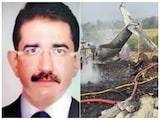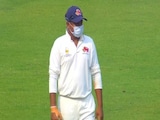Senior advocate Saurabh Kirpal, whose appointment as a High Court judge has been stalled since at least 2017, on Thursday told NDTV that he believed the reason behind the limbo was his sexual orientation.
The comments come in the middle of renewed focus on judges' appointments held up by the government, which earned the disapproval of the Supreme Court last week, as well as a debate over the way judges are picked - by a group of senior judges known as the collegium.
"The reason is my sexuality I don't think the government necessarily wants to appoint an openly gay person to the bench," Mr Kirpal, 50, said in an interview.
"And that's, of course, not the stated reason. And that is part of the problem with the collegium system. They don't give reasons as to why they take their decision. But that's also then the problem with the government not following the law as is," said the advocate who was at the forefront of the fight to decriminalise homosexuality in India.
The union government has been sitting on recommendations for Mr Kirpal's appointment for five years, extending the wait for the first openly gay person to become a judge of an Indian court.
His name was first proposed by the Delhi High Court, but, according to reports, the Intelligence Bureau (IB), tasked with carrying out background checks, said his partner, who is a European national, might pose a security risk.
Based on the agency's reports, the Supreme Court collegium delayed its final decision on Mr Kirpal's recommendation thrice between 2019 and 2020.
Finally, in November 2021, the Supreme Court collegium, headed by then Chief Justice of India NV Ramana, cleared Mr Kirpal's elevation as a judge in the Delhi High Court, overruling the central government's preliminary objections.
Despite this, the government has not announced Mr Kirpal's appointment - a delay that, among others, prompted the Supreme Court last Friday to express its displeasure.
The court said that holding up the names, including those reiterated by the top court's collegium, was "not acceptable".
Mr Kirpal also said he had concerns about the collegium system as well which has led to a public debate between the government and the judiciary.
"I am not one of those people who think that the collegium system is a good system. I think there are many flaws with it. It needs to be improved. Maybe the government needs to have some formal role in appointment," he said.
"Till that is done, the way every citizen of the country obeys the law, it and the government is also bound by the same judgment and Collegium system," he added.
Asked to elaborate on his view that it was his sexual orientation that had held up his elevation, Mr Kripal said, "No one from the government, or the no one the collegium has ever reached out to me for my inputs. Very often I've heard that the reason given is my partner is a human rights activist, but he's not. He's working as a visa officer in the embassy has nothing to do with human rights. But obviously, no one has ever contacted me, so I can't give any kind of clarification."
"I think the government is still against a certain view or has a certain view on [Section] 377 (which criminalised homosexuality) and homosexuality. They never opposed the decriminalisation of 377 [but] they never filed an affidavit saying that it should be decriminalised," he said.
Mr Kripal also said that the views of the government on LGBTQ issues were "outdated".
"We have seen the view of the government in the marriage equality petitions that are pending before the Delhi High Court, where they have very candidly and openly said that marriage can only be between a biological man and a biological woman," he said.
"That is a very outdated view of what it means to be a queer person and what it means to have a certain position on issues of sexuality. So of course, there is a view within the government which is probably more conservative than is the case elsewhere," he said.
"So while 377 itself is gone, I think all the other attributes of full personhood, full citizenship, that that judgment promised, that is yet to be accomplished and that is acting the government is a bit behind," Mr Kirpal said.
"The fact that trans people do not get reservations, even though that was promised in the judgment, shows that there is a certain reticence in accepting the fact that the trans and queer community is a disadvantaged community. And the government needs to go the extra mile to ensure equality," he said.















